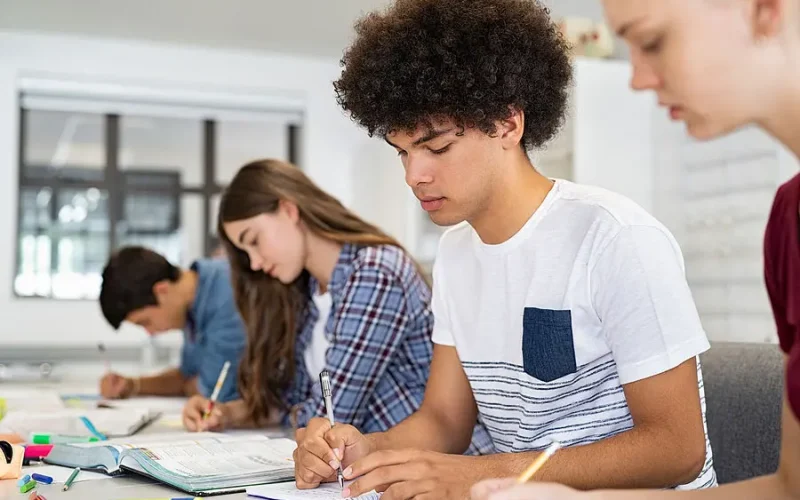One of the looming exams that can send shiver down the spine of most students, even the most confident students, is the Year 10 mocks. With all the fuss about it, one may ask, are Year 10 Mocks really that important? How important are they? of are they just a stressful hurdle you can afford to skip? That’s what we will answer thoroughly in this writing.
As we explore this writing, you will be furnished with more information about Year 10 Mocks; its purpose, how you can benefit from it, the potential downsides, and how you can approach them with the right mindset.
Table of contents
What are Year 10 mocks?
Year 10 mocks are a series of exams students take in their second year of secondary school. They are typically held in the spring term, but the exact timing may vary from school to school.
The exams cover the same material that students will be tested on in their final GCSE exams in Year 11.
Mock exams can be a valuable learning experience for students. They can help students to:
- Get used to the pressure of taking an exam
- Manage their time effectively
- Familiarize themselves with the format of the GCSE exams
- Identify any areas where they need to improve
Mock exams can also help teachers to:
- Assess students’ progress and identify any areas where they need additional support
- Provide students with feedback on their performance
- Make adjustments to their teaching plans
Why are Year 10 mocks important?
Year 10 mocks are important for several reasons. First, they allow students to practice taking exams under timed conditions. This can help students to become more familiar with the format of the exams and to manage their time effectively.
Second, mocks can help students to identify their strengths and weaknesses in each subject. This information can then be used to focus their revision efforts in the run-up to the final exams.
Third, mocks can help students to build their confidence. By experiencing the exam process in advance, students can become more familiar with what to expect and can feel more confident on the day of the real exams.
How Important Are Year 10 Mocks?
Year 10 mocks are important for several reasons. They can help you:
- Get a sense of your strengths and weaknesses in each subject. This will help you focus your revision in the run-up to your real GCSE exams.
- Practice sitting exams under timed conditions. This will help you get used to the pressure of the exam room and manage your time effectively.
- Identify any areas where you need extra help. This will give you time to get the support you need before your real exams.
- Build your confidence. Mock exams can help you feel more confident about your ability to succeed in your GCSE exams.
The importance of year 10 mocks will vary from school to school. In some schools, they help teachers plan their teaching for the rest of the year.
In other schools, they give students a sense of their progress and identify areas where they need to improve.
Ultimately, year 10 mocks is important to help you prepare for your real GCSE exams. Taking them seriously and using them as an opportunity to learn and improve can be a valuable tool in your success.
When are Year 10 mocks?
The exact timing of Year 10 mocks may vary from school to school. However, they are typically held in the spring term, which is the second term of the school year, or summer term of Year 10, and they can be taken in all or some of the subjects that students are studying for GCSE.
The format of the mocks will vary depending on the school, but they will typically be similar to the real GCSE exams in terms of the length of time, the number of questions, and the difficulty level.
This gives students enough time to revise for the exams and to get feedback from their teachers on their performance.
What is the purpose of Year 10 mocks?
The purpose of Year 10 mocks is to help students prepare for their final GCSE exams in Year 11. By taking mocks, students can:
- Get used to the format of the exams
- Manage their time effectively
- Identify their strengths and weaknesses in each subject
- Build their confidence
Mocks can also be used to give students feedback on their performance. This feedback can then help students improve their revision strategies and focus their efforts on the areas where they need the most help.
How seriously should you take Year 10 mocks?
It is important to take Year 10 mocks seriously, but it is also important to remember that they are not the final exams. Mocks help you prepare for the real thing, so don’t get too stressed out if you don’t do as well as you hoped.
Use your mocks as an opportunity to learn from your mistakes and to improve your revision strategies.
Here are some tips for taking Year 10 mocks seriously:
- Revise for each subject thoroughly.
- Get a good night’s sleep before the exams.
- Arrive at the exam early and relax.
- Read the instructions carefully and answer all of the questions.
- Don’t panic if you don’t know the answer to a question. Just make a guess and move on.
- After the exams, review your performance and identify areas where you need to improve.
By following these tips, you can make the most of your Year 10 mocks and get the best possible preparation for your final GCSE exams.
What Happens If You Fail Your Year 10 Mocks?
If you fail your year 10 mocks, don’t panic! It’s not the end of the world. Failing a mock exam simply means that you need to do some more work in that subject.
Here are some things you can do if you fail your year 10 mocks:
- Talk to your teacher about your results and get some advice on improving.
- Set up a revision plan and stick to it.
- Get extra help from your teacher, a tutor, or a friend.
- Practice answering exam questions.
Remember, failing a mock exam does not reflect your intelligence or ability. It simply means that you need to work harder. With a bit of effort, you can still achieve your GCSE goals.
Do Year 10 Mocks Affect Your College Application?
In most cases, year 10 mocks do not affect your college application. However, some colleges may ask for your mock exam results as part of their application process.
If you are applying to a competitive college, doing well in your year 10 mocks is a good idea. This will show the college that you are capable of academic success.
However, don’t put too much pressure on yourself. Your year 10 mocks are just one part of your college application.
Can Foreign Students Take Year 10 Mocks?
Yes, foreign students can take Year 10 mocks. It is a good idea for them to do so, as it will help them to get used to the British education system and to the format of GCSE exams.
If you are a foreign student who is taking Year 10 mocks, there are a few things you can do to prepare:
- Make sure you are familiar with the British education system and the format of GCSE exams.
- Get help from your teacher or a tutor to understand the content of the exams.
- Practice answering questions under exam conditions.
- Don’t worry if you don’t do as well as you hoped in the mocks. Their main purpose is to help you improve your knowledge and skills.
Should You Revise for Year 10 Mocks?
Yes, you should revise for your year 10 mocks. Mock exams are a valuable opportunity to practice answering exam questions and get feedback on your work. They can also help you identify any areas where you need to improve.
Even if you are confident in your ability to do well in your mocks, it is still a good idea to revise. This will help you feel more confident on the exam day and give you the best chance of success.
How Long Should You Revise for Year 10 Mocks?
The amount of time you need to revise for your year 10 mocks will vary depending on your circumstances. However, a good rule of thumb is revising at least a few weeks in advance.
This will give you enough time to cover all of the material and practice answering exam questions.
If you are feeling particularly stressed or anxious about the mocks, you may want to consider revising for longer. However, it is important to avoid cramming, as this can make it harder to remember the information.
Here is a suggested revision schedule for year 10 mocks:
- Week 1: Create a revision timetable and start planning your revision.
- Week 2: Start revising the core topics in each subject.
- Week 3: Continue revising and start practicing answering exam questions.
- Week 4: Review your notes and make sure you are confident in the material.
- Week 5: Take a practice exam to test your knowledge.
If you are struggling to keep up with your revision, don’t be afraid to ask for help from your teachers or parents. They can help you create a right revision plan for you and provide you with the support you need.
Related Post: Is a Nursing Degree Hard? | 2024 Expert Tips
How to revise for Year 10 mocks?
The best way to revise for Year 10 mocks is to start early and to be systematic in your approach. Here are a few tips:
- Make a revision timetable and stick to it.
- Start by reviewing your notes and textbooks.
- Use past papers to practice answering questions.
- Get help from your teachers or a tutor if you struggle with a particular topic.
- Take regular breaks, and don’t try to cram too much in at once.
Here are some additional tips that you may find helpful:
- Create a study space that is quiet and free from distractions.
- Set realistic goals for yourself, and don’t get discouraged if you don’t understand everything immediately.
- Take regular breaks to avoid getting burned out.
- Reward yourself for your hard work.
What happens after Year 10 mocks?
After your Year 10 mocks, your teachers will give you feedback on your performance. This feedback can be used to help you to identify any areas where you need to improve.
You may also be given a predicted grade for each subject. This is an estimate of the grade you will likely achieve in the real GCSE exams.
Schools use the predicted grades to make decisions about which courses students can take in Year 11. They are also used by some universities to make offers to students.
If you are unhappy with your predicted grades, you can talk to your teachers about how to improve your chances of achieving your target grades. You may also want to consider getting some extra help from a tutor.
Overall, Year 10 mocks are a valuable learning experience that can help you to prepare for your GCSE exams. By starting early, being systematic in your revision, and using feedback from your teachers, you can make the most of this opportunity and improve your chances of success.
Exam Revision Tips for Your Year 10 Mocks
Here are some exam revision tips for your year 10 mocks:
- Start revising early.
- Create a revision timetable and stick to it.
- Find a revision method that works for you.
- Take breaks when you need them.
- Don’t cram the night before the exam.
- Get a good night’s sleep before the exam.
- Eat a healthy breakfast on the day of the exam.
- Arrive at the exam early.
- Stay calm and focused during the exam.
Conclusion
The most important thing is to approach mocks with a growth mindset. Year 10 Mocks exams don’t define your academic future, but they can be a valuable tool to enhance your learning journey.
See them as an opportunity to get familiar with the exams, learn from your mistakes, refine your revision strategies, and gain valuable experience under timed conditions.
FAQs
The number of mock exams you take in Year 10 will vary depending on your school. However, you will typically take at least one mock exam in each subject that you are studying for GCSE.
Year 10 mocks are not as important as your actual GCSE exams but still important.
Don’t worry if you don’t do as well as you hoped in your Year 10 mocks.
References
- thinkstudent.co.uk-How Important Are Year 10 Mocks
- corecity.academy-How Important Are Year 10 Mocks
- insights.gostudent.org- mock-exams-why-important


